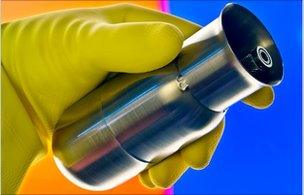Hydrogen made by enzyme is faster and cheaper
- Published

Storing and transporting hydrogen is seen as vital for the future of clean energy
Scientists have shown how an enzyme from a microbe can produce hydrogen from water more quickly and cheaply.
Hydrogen is seen as vital to future energy systems, but a major problem has been making this reaction fast and cheap enough to be viable.
The new takes us a step closer to this vision by avoiding the use of rare and costly chemicals to extract it from water.
It hijacks nature's own tricks to produce hydrogen - but far faster.
Turning electrical energy into chemical energy in the form of hydrogen, and then releasing it again on demand, is the key to any future hydrogen energy solution.
Hydrogen can be split from water wherever electricity is available, even at home. And with a fuel cell it can be turned back into electricity, with water as the benign by-product.
If the electricity comes from a local renewable source such as a wind farm or array of solar cells, this means clean, independent and portable power that can be stored until needed.
Fuel cells need what is known as a catalyst to speed up the chemical reactions that create hydrogen gas from water. Platinum is very good at this but it is famously expensive and rare.
Some microbes, though, have known for a billion years how to make enzymes - a kind of biological catalyst - that can do the job using the cheap and abundant elements nickel and iron.
These natural enzymes are unfortunately difficult to obtain and do not survive well outside the microbe.
Now researchers have managed to make a synthetic, toughened-up version.
Real-world viability
So far, they have looked at just one step in the complex reaction, in which two hydrogen atoms taken from water are snapped together to make hydrogen gas.
But their new synthetic enzyme is performing surprisingly well; it is 10 times faster than the natural one, making 100,000 molecules of hydrogen gas every second.
"This nickel-based catalyst is really very fast," said co-author Morris Bullock of the Pacific Northwest National Laboratory in Washington state in the US.
Gavin Walker of the University of Nottingham, who was not involved in the study, agreed.
"In general, enzymes are already a lot faster than traditional catalysts like platinum - normally orders of magnitude faster, so this is exciting," he told ┤¾¤¾┤½├¢ News.
Although it is fast, at present the process uses up too much electrical energy to be viable for real-world applications.
However, the authors note that "these results highlight the substantial promise molecular catalysts hold for the production of hydrogen".
"One of the nice things about hydrogen is that it's a versatile energy vector; it can be generated from a number of sources - wind, solar, biomass," said Professor Walker.
"But can it be done efficiently and how much will it cost? That's why this is an important discovery - looking at cheaper alternatives for the catalysts.
"If we can go across to using iron and nickel, that will be a lot cheaper. This will hopefully lead to cheaper hydrogen."
Related topics
- Published8 August 2011
- Published23 December 2010
- Published7 July 2011